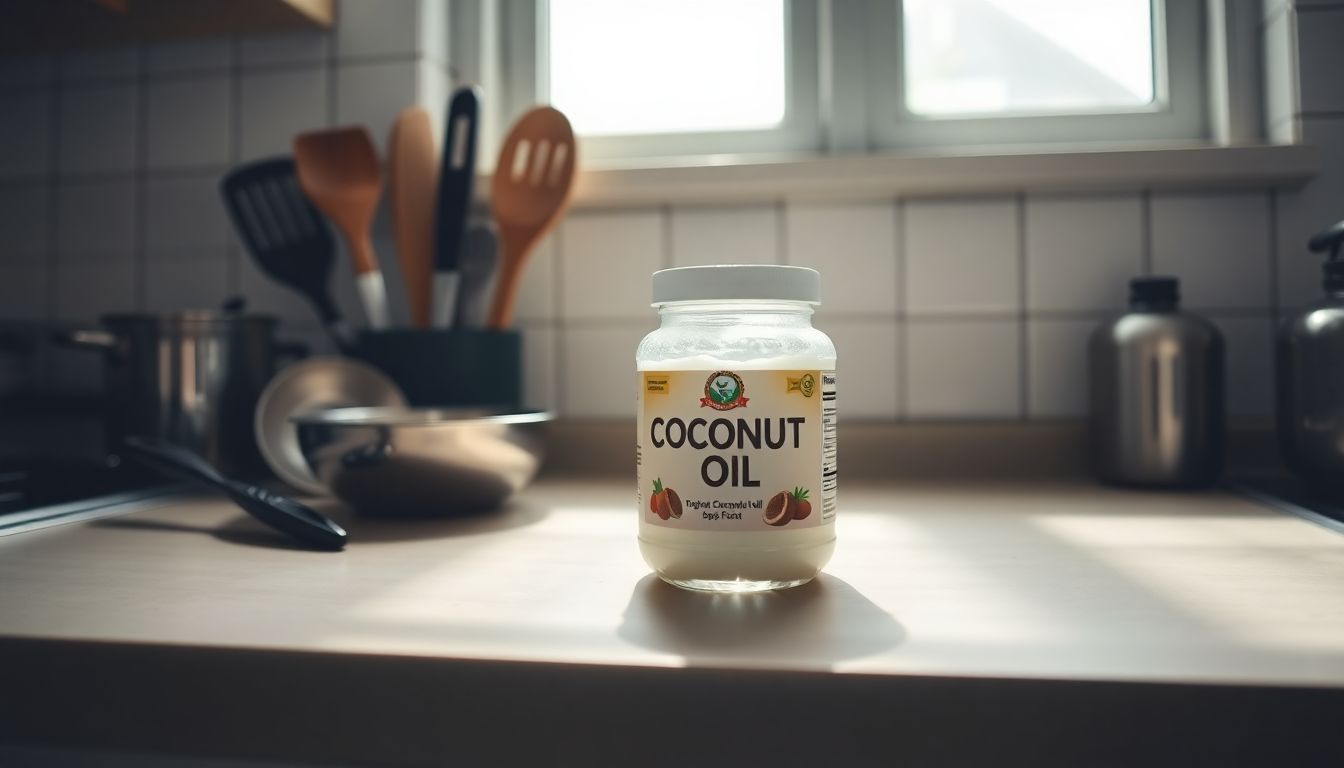Confused about whether coconut oil is truly healthy or just hype? It’s packed with saturated fats like medium-chain triglycerides (MCTs), which may boost energy and support weight loss.
Thank you for reading this post, don't forget to subscribe!This blog breaks down the facts, claims, and science behind its rising popularity. Keep reading to learn what coconut oil can—and can’t—do for your health!
Key Takeaways
- Coconut oil is 90% saturated fat, which raises LDL (“bad”) cholesterol and increases heart disease risk. Experts recommend limiting its intake to less than 7% of daily calories (AHA guidance).
- Medium-chain triglycerides (MCTs) in coconut oil may boost energy and aid weight loss but evidence remains limited. Overuse can outweigh potential benefits.
- Healthier alternatives like olive or safflower oils are recommended for better heart health as they have lower saturated fat content and don’t significantly raise LDL cholesterol.
- Tropical diets high in coconut oil also include whole foods and fewer processed items, which influence overall health more than the oil alone.
- Marketing claims about coconut oil being a “miracle food” are often exaggerated. Moderation is key for safe use in cooking or beauty routines.
Examining Coconut Oil’s Popularity

Coconut oil has gained attention as a versatile cooking and health product. Many see it as a healthier alternative to other fats, adding fuel to the craze.
Reasons behind the surge in coconut oil usage
The rise in coconut oil’s use ties to its claimed health benefits, from weight loss support to immune boosting. Many believe the medium-chain triglycerides (MCTs) in coconut oil speed up metabolism.
Diet trends like Paleo and ketogenic also push its popularity due to its fat composition and unique flavor.
Health buzz often links coconut oil with energy boosts and cognitive health. Virgin coconut oil finds favor as a natural alternative for cooking compared to vegetable oils or butter.
Its role in beauty products adds appeal, further driving its demand across various markets.
“Coconut oil has gone from pantry staple to wellness superstar.”
Common claims about coconut oil benefits
Coconut oil has become a health food favorite, with many claims about its benefits. People often say it helps with weight loss due to its medium-chain triglycerides (MCTs). These fats are quickly burned by the body for energy instead of being stored.
Some studies suggest MCTs might boost metabolism and aid in fat loss, but evidence remains limited.
Others claim coconut oil improves heart health by raising HDL cholesterol, or “good” cholesterol. While this is true to an extent, it also increases LDL cholesterol (“bad” cholesterol) because it’s high in saturated fat.
Experts from Harvard Medical School stress moderation since too much saturated fat can raise cardiovascular risk. Cooking with olive or safflower oil could be better alternatives for heart disease prevention.
Coconut Oil and Heart Health
Coconut oil has sparked debates about its effect on heart health. Some say it helps cholesterol levels, while others worry about its saturated fat content—what does the science show?
Impact on cholesterol levels
Coconut oil is packed with saturated fat—about 90% of its fat content. Eating too much saturated fat can raise LDL cholesterol, the “bad” kind, which increases heart disease risk.
A 2016 study linked high intake of saturated fats to more cases of cardiovascular disease.
Health experts advise limiting these fats to less than 7% of your daily calories. While coconut oil might bump up HDL cholesterol (the “good” type), its effect on raising LDL overshadows this benefit.
Oils like olive or safflower are healthier choices for better cholesterol management and heart health. Moderation is key if you choose to include it in your diet.
Comparison with other fats
Transitioning from the impact of coconut oil on cholesterol levels, it’s worth exploring how it fares when compared to other dietary fats. The following table offers a breakdown of key nutritional differences and their potential effects on health:
| Fat Type | Source Examples | Saturated Fat Content | Effect on LDL Cholesterol | Health Recommendations |
|---|---|---|---|---|
| Coconut Oil | Coconut, coconut-based products | ~90% | Increases LDL cholesterol | Limit intake due to high saturated fat |
| Butter | Dairy (milk, cream) | ~65% | Raises LDL cholesterol | Consume in moderation |
| Olive Oil | Olives, olive-based products | ~14% (mostly unsaturated fats) | No significant LDL increase | Preferred for heart health |
| Vegetable Oils (e.g., Sunflower, Canola) | Plant seeds (sunflower, rapeseed) | ~7-10% saturated fat | Lowers LDL cholesterol | Recommended for cooking |
| Beef Fat (Tallow) | Animal fat (beef) | ~50% | Increases LDL cholesterol | Use sparingly |
This comparison highlights distinct differences. Coconut oil stands out for its high saturated fat content, significantly more than butter or beef tallow. In contrast, oils like olive and canola are rich in unsaturated fats, offering better choices for heart health. Public health guidelines advise limiting saturated fats to less than 7% of daily calories, emphasizing the importance of mindful consumption.
The Science Behind the Claims
Coconut oil has sparked debates among scientists. Recent research shows mixed results on its impact, leaving experts divided.
Evidence from recent studies
A 2016 study in *Circulation* found a link between high saturated fat intake and increased cardiovascular disease risk. Since coconut oil is about 90% saturated fat, it can raise LDL cholesterol levels, often called “bad” cholesterol.
This increase may harm heart health if consumed heavily.
The American Heart Association recommends keeping saturated fats below 7% of daily calories for better cardiovascular health. While coconut oil does contain some lauric acid, which might boost HDL cholesterol (the “good” kind), the overall effect on heart disease remains unclear.
Experts agree moderation is key when using this cooking oil.
Expert opinions on coconut oil’s health effects
Experts stress caution with coconut oil. It’s about 90% saturated fat, which can raise LDL cholesterol—that’s the bad kind linked to heart disease. The American Heart Association suggests keeping saturated fats under 7% of daily calories for better cardiovascular health.
Some specialists highlight potential benefits too. Coconut oil contains medium-chain triglycerides (MCTs), which might boost quick energy and aid weight loss. Still, they recommend using it sparingly—like butter or lard—and favor healthier options like olive oil or nuts for long-term cholesterol management and heart health.
Coconut Oil in Diets Around the World
Coconut oil plays a big role in the diets of tropical communities. Its use varies, often shaped by local recipes and cooking styles.
Role in tropical diets
Coconut oil plays a big part in tropical diets. It is used for cooking, frying, and even as a spread. Many tropical regions depend on it due to its availability and long shelf life.
The oil adds flavor to rice dishes, curries, and baked goods.
People in these areas often consume fresh coconut meat too. This provides them with fats like saturated fat for energy. Unlike olive or safflower oil, coconut oil stays solid at room temperature in cooler climates but melts quickly in warm ones—making it handy for daily use near the equator!
Differences in dietary impact
Diet impacts vary based on culture and region. In tropical areas, coconut oil plays a big part in daily meals. People there often use it as their main cooking fat. This contrasts with Mediterranean diets that favor olive oil or extra-virgin olive oil, which are lower in saturated fats.
High saturated fat intake from coconut oil raises LDL cholesterol levels for many people. It also increases the risk of heart disease more than fats like safflower or olive oil. On the other hand, medium-chain triglycerides (MCTs) in coconut oil may provide quick energy and support weight management differently based on individual diets.
Moderation is key to managing these effects across different populations.
Beyond the Hype: Real Benefits of Coconut Oil
Coconut oil does offer some genuine perks, despite all the noise. It can support certain aspects of wellness when used wisely and in moderation.
Proven health benefits
Coconut oil has gained attention for its potential health perks. Some benefits have been backed by studies, while others remain debated.
- Contains medium-chain triglycerides (MCTs), which are metabolized quickly by the body. This may provide fast energy and support weight loss efforts.
- Helps improve digestion when consumed in moderation due to the fiber found in coconut meat-derived products.
- May boost HDL cholesterol, also known as “good” cholesterol, which is important for better heart health.
- Offers antimicrobial properties thanks to lauric acid, which can help fight certain bacteria or fungi in small doses.
- Enhances skin and hair care routines with moisturizing effects when used topically, not just in diets.
Next is how it impacts global diets and traditions…
Misconceptions and overstatements
Many health claims about coconut oil are exaggerated. Marketing often portrays it as a miracle cure, but this isn’t true. Coconut oil consists of 90% saturated fat—a type linked to higher LDL cholesterol levels.
Elevated LDL cholesterol increases the risk of heart disease and is far from heart-healthy.
Some believe tropical diets support these health claims since they include coconut products. Yet, those diets also have more whole foods and less processed sugar—factors that contribute to better overall health.
Consuming too much coconut oil can harm instead of help, especially without moderation or attention to dietary balance. Always check labels for added sugars or unhealthy ingredients in coconut-based items to avoid misleading “health” food traps.
Conclusion
Coconut oil has sparked both interest and debate. While it offers some benefits like quick energy from MCTs, its high saturated fat content raises concerns for heart health. Balance is key—use coconut products moderately as part of a varied diet.
Consider expert advice before making big changes to your eating habits. Science reminds us: no single food is a cure-all.
